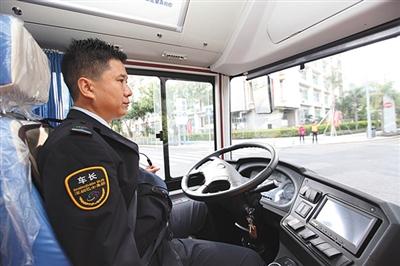Legitimacy of driverless driving still questionable
- By Wu Jin
 0 Comment(s)
0 Comment(s) Print
Print E-mail China.org.cn, December 7, 2017
E-mail China.org.cn, December 7, 2017
The use of vehicle automation that allows drivers to switch between manned and unmanned operation is still raising questions about safety and legal issues, according to The Beijing News.

On Dec. 2, 2017, a line-up of buses was spotted crawling along the boulevards between Hailiang, Shenba and Futian Stations in Shenzhen, a distance of about 1.2 kilometers.
Different from the conventional tests, the buses, installed with laser and millimeter-wave radars, video cameras and GPS antennae, were steered automatically without the intervention of any human in the driving seat.
By evaluating the signals sent by the sensory equipment, industrial computers and Vehicle Control Units can analyze, judge and react to traffic conditions and direct the vehicle to accelerate, slow down and stop, turn, pass through junctions, park at roadside or change lanes.
The new bus, of moderate size comparing to ordinary buses with a capacity of no more than 25 passengers, can reach a maximum speed at 40 kilometers per hour (kph) and an average speed of 25 kph. At the same time, its batteries can be recharged in 40 minutes and it can then run for a distance up to 150 kilometers.
Owned by the Shenzhen Bus Group Co Ltd, the driverless buses had experienced closed-door tests for four consecutive months under different road conditions before making their public debut.
However, according to the Transportation Commission of Shenzhen Municipality, the buses are still being tested using data collected from traffic routes, passenger flows and smart driving systems and there is no immediate plan to open them for general public use.
However, a certain number of passengers are welcomed to take free rides during the trial runs to provide feedback and suggestions.
According to international standards, the operation of prototype vehicles is divided into six categories ranging from L0 to L5. L0 refers to normal manned driving while L5 is completely unmanned. The buses in Shenzhen are mostly operating at a level of L3 plus, which means the buses can operate almost independently without the help of drivers as long as there are no emergencies where sudden braking is needed.
The expansion of the smart driving will probably relieve the shortage and lessen the tedious nature of bus driving, besides, enabling the traffic safety to be better guaranteed, said Luo Lan, spokesman of Shenzhen Bus Group Co Ltd.
However, the company also reckons that the smart buses are still in trial operation and the traffic routes cannot be officially opened yet. The suspended launch of the driverless buses is not an exception across the country.
In August, this year, an automatically steered and electricity-powered bus with a length of 12 meters was rolled out in Hunan Province. However, despite its successful testing, such as, making turns or changing lanes, it has yet to be placed in service.
Robin Li, known as Li Yanhong in Chinese, CEO of Baidu Inc, admitted in the latest annual Baidu World Conference that their self-driving car had received a traffic ticket.
Zhang Qihuai, an attorney from Lanpeng Law Firm, said, the traffic law in China had yet to cover the operation of unmanned vehicles. And lawyer Wang Yongjie from Beijing Zeyong Law Firm warned that the vacuum in law pertinent to self-driving may result in severe penalties if the drivers take their hands off the steering wheel.






Go to Forum >>0 Comment(s)